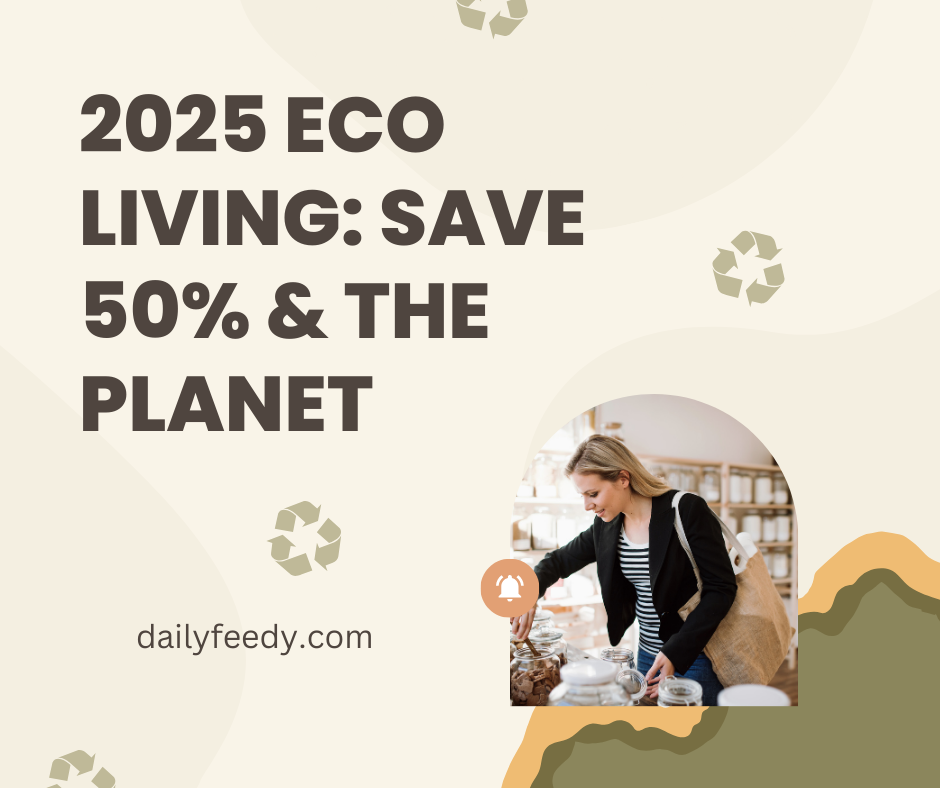Sustainable Living in 2025: 25 Futuristic Trends to Save Money and the Planet
Table of Contents
1. 2025’s Mega Trends in Sustainable Living
The year 2025 marks a tipping point where technology, policy, and consumer demand converge to make sustainable living accessible, affordable, and even profitable. Here’s what’s driving the movement:
A. AI-Driven Resource Management
- Smart Homes 2.0: AI systems like Google Nest 2025 analyze energy/water usage in real-time, auto-adjusting thermostats, and flagging waste (e.g., “Your shower used 30% extra water this week”).
- Food Waste Apps: Too Good To Go 2025 partners with supermarkets to sell surplus food at 70% off via geolocated flash sales.
B. Circular Economy Goes Mainstream
- Repair Cafés: Free community hubs (sponsored by brands like Patagonia) teach skills like smartphone repair and garment mending.
- Blockchain for Recycling: Apps like RecycleChain reward users with crypto tokens for proper e-waste disposal, redeemable at eco-stores.
C. Climate-Positive Consumerism
- Carbon-Labeled Products: Every item in stores like IKEA displays a “carbon cost” (e.g., “This T-shirt = 2.5kg CO2”).
- Water-Neutral Fashion: Brands like Allbirds 2025 offset H2O used in production by funding clean water projects.
Image Idea: Infographic titled “2025’s Sustainability Trinity: AI, Circular Economy, Climate Accountability.”
2. 10 Must-Try Sustainable Innovations for 2025
1. Solar-Powered Balconies
- Product: Tesla SolarTile Mini ($299) – Attachable panels for urban renters, generating 20% of a household’s energy.
- Case Study: A Berlin apartment complex reduced energy bills by 35% collectively.
2. Air-to-Water Devices
- How It Works: Source Hydropanel 2025 extracts H2O from humidity (5 liters/day), ideal for drought-prone areas.
- Cost: $499 with a 10-year warranty.
3. Mycelium Furniture Kits
- DIY Trend: Grow chairs/tables using mushroom roots (GrowIt Home 2025).
- Benefits: 100% biodegradable, fire-resistant, and costs 50% less than wood.
4. Algae-Based Packaging
- Innovation: Brands like Notpla 2025 create edible seaweed pouches for sauces and shampoo.
- Stats: Reduces plastic use by 90% and decomposes in 6 weeks.
5. Smart Reusable Bottles
- Product: AirUp 2025 tracks hydration levels and locates free refill stations via GPS.
6. 3D-Printed Composters
- Tool: Lomi 2.0 turns food scraps into fertilizer in 12 hours.
- Hack: Use compost to grow herbs in Click & Grow Smart Gardens.
7. Digital Fashion Rentals
- Platform: DressX AR lets you “wear” digital outfits on social media for $5/day, cutting fast fashion demand.
8. Lab-Grown Leather
- Brand: Bolt Threads 2025 sells wallets/jackets made from lab-engineered collagen, no animals harmed.
9. AI-Powered Thrift Stores
- App: ThredUp 2025 uses AI to auto-price and photograph resale items, earning users 70% profit.
10. Carbon Capture Plants
- For Homes: Climeworks 2025 offers mini direct-air capture devices that store CO2 in basements (offset 1 ton/year).
Image Idea: “2025’s Eco-Innovations” carousel with product photos and specs.
3. 2025’s Budget-Friendly DIY Projects
Project 1: Biodegradable Glitter
- Materials: Cellulose film (from seaweed), saltwater, natural dyes.
- Steps:
- Dissolve 1 cup cellulose in boiling water.
- Add 2 tbsp salt and dye (e.g., beetroot for pink).
- Spread thinly, dry, and crush into glitter.
Project 2: Solar-Powered Phone Charger
- Cost: $20
- Parts: Recycled laptop battery, 10W solar panel, USB adapter.
- Use: Charges a phone in 2 hours of sunlight.
Project 3: Repurposed Plastic Brick Garden
- Idea: Melt discarded plastic into bricks using a Precious Plastic 2025 community machine.
- Build: Raised garden beds, birdhouses, or outdoor stools.
Image Idea: Video stills showing a teen creating plastic bricks at a community workshop.
4. 2025’s Policy Shifts: What You Need to Know
A. Plastic Tax:
- Single-use plastic costs 200% more in the EU and California, pushing consumers toward reusable alternatives.
B. Right-to-Repair Laws:
- Tech giants like Apple must provide repair manuals and sell spare parts globally.
C. Carbon Dividend Programs:
- Residents in Canada and Scandinavia earn $300/year for maintaining low carbon footprints (tracked via apps).
D. Urban Farming Subsidies:
- Cities like Singapore pay 50% of rooftop garden setup costs to boost food security.
Image Idea: “2025 Global Sustainability Policy Map” highlighting key regions.
5. Case Study: A Zero-Waste Family in 2025
The Johnsons’ Journey:
- Location: Suburban Texas
- Goals: Cut waste by 95%, save $3k/year.
Strategies:
- AI Fridge Manager: Tracks expiry dates, auto-orders bulk refills in compostable packaging.
- Clothing ID Chips: Scan garments to find repair shops or resale value on ReCircled.
- Community Solar Grid: Joined 10 neighbors to share renewable energy, slashing bills by 40%.
Results:
- 1 trash bag/month vs. 15 previously.
- $3,200 annual savings redirected into college funds.
Image Idea: Family photo in a solar-paneled backyard with a “Zero Waste 2025” banner.
6. 2025’s Sustainable Food Revolution
A. Vertical Farming Kits:
- Product: Gardyn 3.0 grows 30 plants indoors using AI and 10% of traditional water.
B. Lab-Grown Meat:
- Brand: Eat Just 2025 sells cultured chicken at $5/pack (80% lower emissions).
C. Insect Protein Snacks:
- Trend: Cricket flour chips and mealworm energy bars hit Costco shelves, offering 3x more protein than beef.
D. AI Recipe Apps:
- PlantJammer 2025 scans pantry items and suggests zero-waste recipes (e.g., “Turn wilted spinach into pesto”).
Image Idea: “2025’s Kitchen of the Future” with vertical farms and lab-grown meat labels.
15 Best Free AI Tools for Small Businesses in 2025
7. FAQs: Sustainable Living in 2025
Q: Is sustainable living expensive in 2025?
A: No! AI and lab-grown materials cut costs (e.g., algae packaging is 30% cheaper than plastic).
Q: How can I convince my landlord to install solar panels?
A: Cite 2025 tax breaks like the U.S. Solar Tax Credit (covers 40% of installation).
Q: Are there apps to find repair cafés?
A: Yes! FixIt Global 2025 maps 50k+ free repair hubs worldwide.
8. Resources & Tools for 2025
- Podcasts: The Sustainable Futurist (covers AI ethics and eco-tech).
- Courses: Coursera’s 2025 Circular Economy Certification.
- Communities: Zero Waste 2025 Facebook Group (1M+ members).

